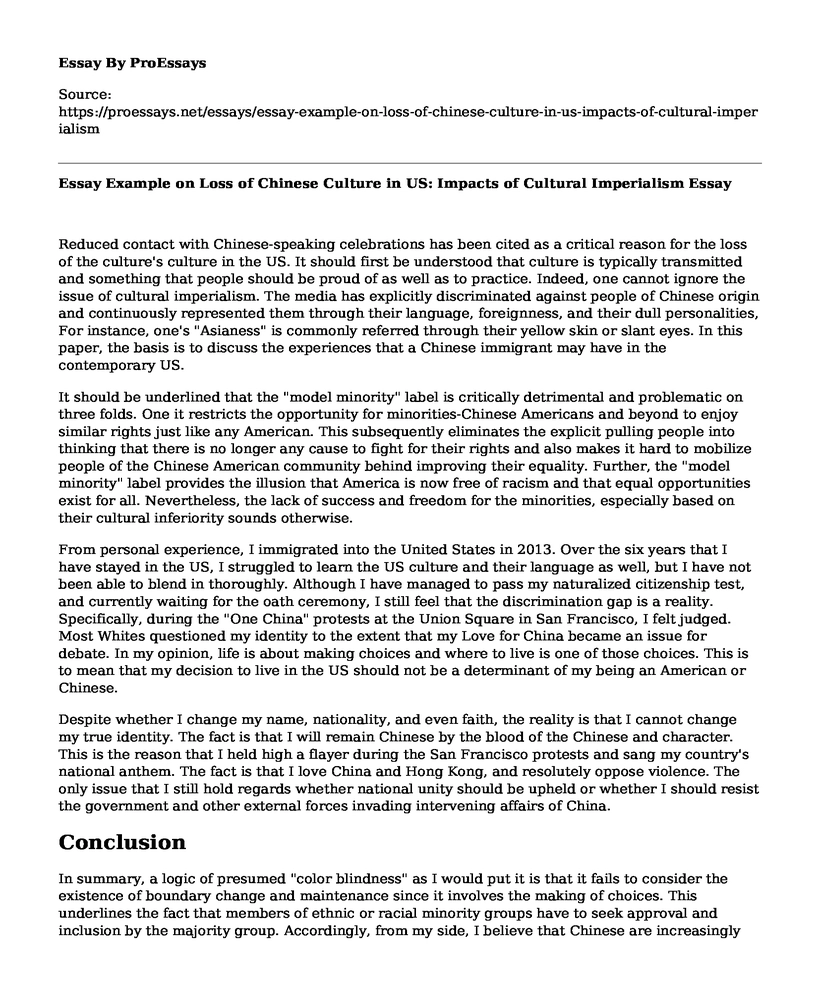Reduced contact with Chinese-speaking celebrations has been cited as a critical reason for the loss of the culture's culture in the US. It should first be understood that culture is typically transmitted and something that people should be proud of as well as to practice. Indeed, one cannot ignore the issue of cultural imperialism. The media has explicitly discriminated against people of Chinese origin and continuously represented them through their language, foreignness, and their dull personalities, For instance, one's "Asianess" is commonly referred through their yellow skin or slant eyes. In this paper, the basis is to discuss the experiences that a Chinese immigrant may have in the contemporary US.
It should be underlined that the "model minority" label is critically detrimental and problematic on three folds. One it restricts the opportunity for minorities-Chinese Americans and beyond to enjoy similar rights just like any American. This subsequently eliminates the explicit pulling people into thinking that there is no longer any cause to fight for their rights and also makes it hard to mobilize people of the Chinese American community behind improving their equality. Further, the "model minority" label provides the illusion that America is now free of racism and that equal opportunities exist for all. Nevertheless, the lack of success and freedom for the minorities, especially based on their cultural inferiority sounds otherwise.
From personal experience, I immigrated into the United States in 2013. Over the six years that I have stayed in the US, I struggled to learn the US culture and their language as well, but I have not been able to blend in thoroughly. Although I have managed to pass my naturalized citizenship test, and currently waiting for the oath ceremony, I still feel that the discrimination gap is a reality. Specifically, during the "One China" protests at the Union Square in San Francisco, I felt judged. Most Whites questioned my identity to the extent that my Love for China became an issue for debate. In my opinion, life is about making choices and where to live is one of those choices. This is to mean that my decision to live in the US should not be a determinant of my being an American or Chinese.
Despite whether I change my name, nationality, and even faith, the reality is that I cannot change my true identity. The fact is that I will remain Chinese by the blood of the Chinese and character. This is the reason that I held high a flayer during the San Francisco protests and sang my country's national anthem. The fact is that I love China and Hong Kong, and resolutely oppose violence. The only issue that I still hold regards whether national unity should be upheld or whether I should resist the government and other external forces invading intervening affairs of China.
Conclusion
In summary, a logic of presumed "color blindness" as I would put it is that it fails to consider the existence of boundary change and maintenance since it involves the making of choices. This underlines the fact that members of ethnic or racial minority groups have to seek approval and inclusion by the majority group. Accordingly, from my side, I believe that Chinese are increasingly trying to chase the recognition by the majority group, and this is being denied to them.
Cite this page
Essay Example on Loss of Chinese Culture in US: Impacts of Cultural Imperialism. (2023, Feb 11). Retrieved from https://proessays.net/essays/essay-example-on-loss-of-chinese-culture-in-us-impacts-of-cultural-imperialism
If you are the original author of this essay and no longer wish to have it published on the ProEssays website, please click below to request its removal:
- Good and Bad Sides about Being a Single Mother
- Essay Sample on Systems Perspective
- Essay Sample on Afro-Futurism
- Essay Sample on International Relations in Society
- Essay Example on Latino and Hispanic Americans: A Diverse Group in America
- Essay Example on One Tweet, One Life: Jon Ronson and Justine Sacco's Story
- The Reality of Racial Inequality in the US: A Look Into Personal Lives - Research Paper







